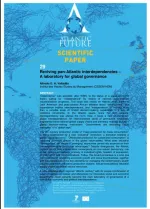Reviving pan-Atlantic interdependencies – A Laboratory for Global Governance

Scientific Paper, nº. 29
“Dependence” was elevated, after WWII, to the status of a social-economic theory calling for “independence” by means of national state-oriented industrialization programs. This issue was mostly an Atlantic affair, linked to Latin American and post-colonial African debates about “development”. But dependence implies interdependence, and “independence” is nothing more
than a variable scale of limited decision-making capabilities in a sea of collective constraints. In the Atlantic space, since the first caravels, interdependency was always the norm. Now, it faces a new phenomenon: global interdependence. An interconnected world of permanent innovation, fragmented trans-national global supply chains and planetary markets lacking a
global decision-making mechanism. Governments are becoming “local managers” of a “global logic”.
The 20th century production model of “mass production for mass consumption” is being superseded by a new “industrial” revolution: a transition towards a global “digital economy”. “Distributed production for customized consumption” is capturing dominant shares of the global value-added. What does industrial “development” still means if “emerging” economies cannot rely anymore on their low-wage/low-skills production advantages? Despite divergences, the Atlantic regions benefit from a reasonable convergence on core values: democracy, rule
of law, economic freedoms, primacy of individual rights, freedom of expression, of information and communications. Today, this broad consensus is a sine qua non condition for promoting economic growth and social inventiveness, together with the possession of the key elements for managing the contemporary wealth creation: high-tech innovative production clusters, robust transnational industrial supply chains, abundant natural resources.
A new interdependent regional “Atlantic century” with its unique combination of basic consensus on values and elbowroom for innovative social and economic experiments could certainly become the main laboratory of governance of a new global economic and political interdependence.